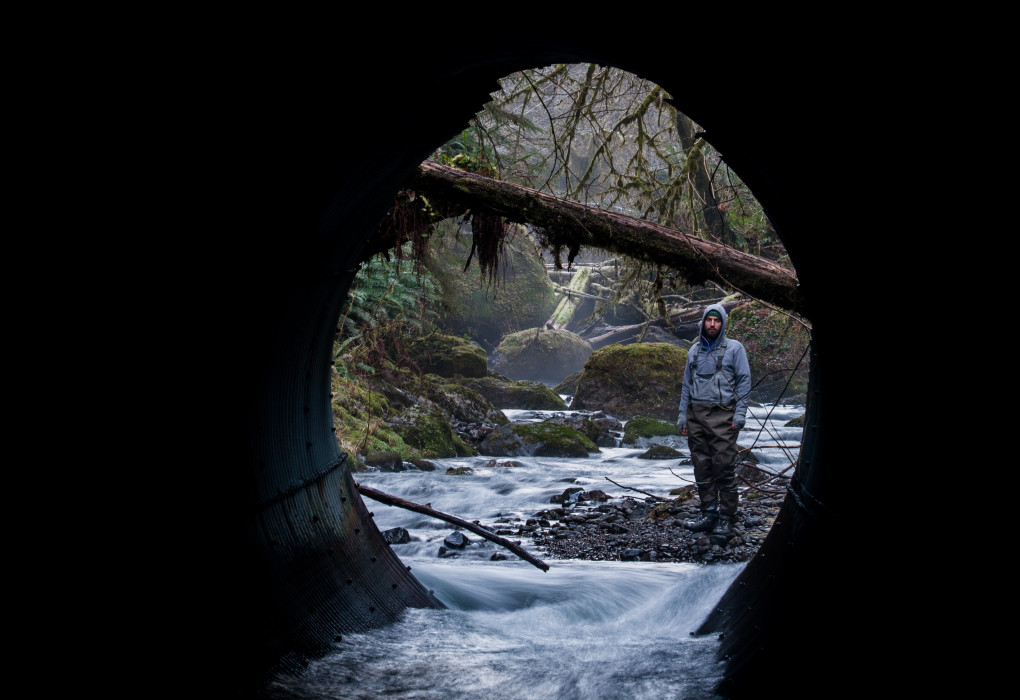Following Through
The sun begins to glimmer , illuminating the highest hills in the coast range. My truck rattles down a gravel road leading to an intimate Oregon coastal stream within the Siuslaw National Forest: a place filled with mist, moss, cyan colored water, sitkas, cedars, bald eagles, and wild winter steelhead. This is a love at first sight kind of watershed.
Later, through years of stewardship and stream side friendships, I learned that this watershed is also a remarkable example of nature’s resiliency. It was logged extensively until the 1970s. Hatchery steelhead programs persisted until 1992. The estuary was diked and channelized.
It was through the action of the late Ben Schaad that this stream’s declining trajectory reversed. His expertise and vocal support was a key factor improving its once poor forestry practices, while also removing all hatchery fish from the system. The stream has rebounded greatly since the forest has grown back and wild anadromous fish runs are currently strong. Despite these positive changes, a few old challenges persist and require our attention.
One of these challenges is a culvert constructed in the 1950s at the base of North Creek -- the second largest tributary present within the basin. North Creek has the coolest stream temperatures in the watershed, is surrounded by extensive old growth forest, and has great spawning grounds for all forms of anadromous fish. Before the culvert’s placement, North Creek was a very productive tributary, especially for Chinook salmon. Currently, the culvert cuts off thirteen miles of fish passage and degrades downstream habitat. These factors motivated me to focus my stewardship efforts on replacing this old culvert with new fish friendly passage.
Over time I learned that the Forest Service and watershed councils had considered this project previously, but due to high cost estimates it was not pursued further. I felt that given the proper timing and connections, this project could and should become a reality. Restoring access to North Creek would be great for wild, native fish.
The opportune moment presented itself at the start of 2015. Coincidentally, I had moved to Michigan the year before to pursue a master’s degree in Physical Therapy. I realized that I needed to target the primary decision makers and convince the Forest Service that this was a project worth prioritizing. Taking the initiative, I began to generate public support within the conservation community while also writing letters to the Forest Service and watershed councils. The result was the formation of a committed group of constituents who began the process of replacing the culvert with a more suitable structure.
Currently, the Forest Service and watershed council’s efforts have generated roughly half of the estimated $500,000 needed to complete the project. We will be moving from planning to implementation this autumn, replacing the 13-foot diameter culvert with a bridge structure spanning approximately 50 feet. The North Creek Culvert Project is scheduled for completion during the summer of 2018.
Being an active participant in this project has given me confidence in the power of persistence, commitment, and collaboration. I will be graduating and moving back to Oregon next year and I am excited to soon be able to drive with my sons across a newly constructed North Creek Bridge as we experience rehabilitation in action. This stream’s trees, canyon walls, fish, and birds all intertwine and keep me captivated, inspiring me to accomplish more.
In the time that remains, our coalition will increase public awareness around the project and work to secure the $250,000 needed to complete the project.
To learn more, volunteer, and/or donate check out our North Creek Campaign Page
